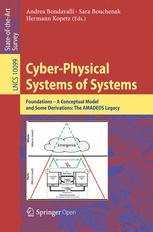

Most ebook files are in PDF format, so you can easily read them using various software such as Foxit Reader or directly on the Google Chrome browser.
Some ebook files are released by publishers in other formats such as .awz, .mobi, .epub, .fb2, etc. You may need to install specific software to read these formats on mobile/PC, such as Calibre.
Please read the tutorial at this link: https://ebookbell.com/faq
We offer FREE conversion to the popular formats you request; however, this may take some time. Therefore, right after payment, please email us, and we will try to provide the service as quickly as possible.
For some exceptional file formats or broken links (if any), please refrain from opening any disputes. Instead, email us first, and we will try to assist within a maximum of 6 hours.
EbookBell Team

4.7
66 reviewsThis book is open access under a CC BY 4.0 license.
Technical Systems-of-Systems (SoS) – in the form of networked, independent constituent computing systems temporarily collaborating to achieve a well-defined objective – form the backbone of most of today’s infrastructure. The energy grid, most transportation systems, the global banking industry, the water-supply system, the military equipment, many embedded systems, and a great number more, strongly depend on systems-of-systems. The correct operation and continuous availability of these underlying systems-of-systems are fundamental for the functioning of our modern society.
The 8 papers presented in this book document the main insights on Cyber-Physical System of Systems (CPSoSs) that were gained during the work in the FP7-610535 European Research Project AMADEOS (acronym for Architecture for Multi-criticality Agile Dependable Evolutionary Open System-of-Systems). It is the objective of this book to present, in a single consistent body, the foundational concepts and their relationships. These form a conceptual basis for the description and understanding of SoSs and go deeper in what we consider the characterizing and distinguishing elements of SoSs: time, emergence, evolution and dynamicity.